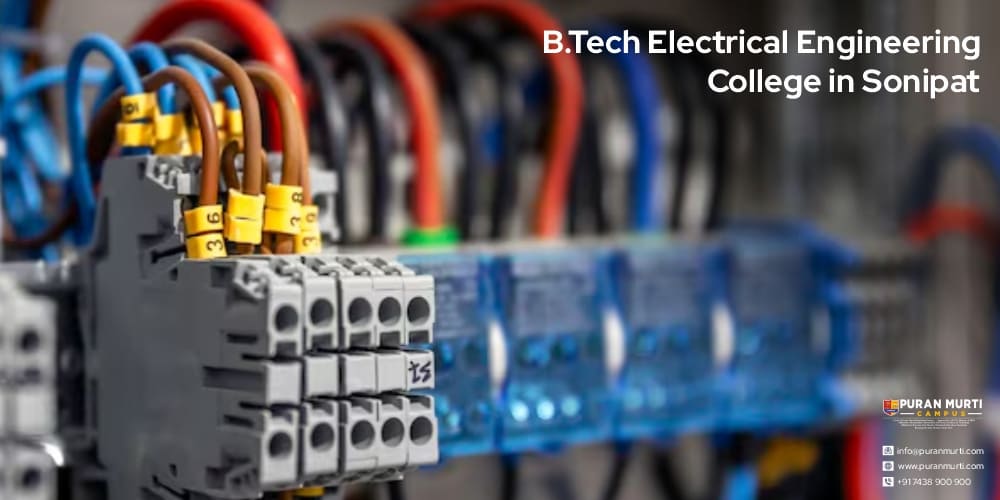B.Tech Electrical Engineering college in Sonipat
Posted on : 24 September, 2025 4:17 pm
Electrical engineering is a core branch of engineering that deals with the study, design, development, and application of electrical systems and technologies. Electrical Engineering is one of the oldest and most essential branches of engineering, shaping the way we live, work, and communicate today. It focuses on everything that involves electricity, electromagnetism, and electronics from tiny circuits to massive power plants. It is the field that deals with the study and application of electricity, electromagnetism, and electronics, enabling innovations in power systems, renewable energy, automation, and beyond.
A college provides you with Academic Knowledge, Core Subject, Labs, Practical experiments, latest
Technologies and Practical Exposure, Workshop, Internships, Industrial Visits and Projects.
Skill Development, use of software tools MATLAB, ETAP, AutoCAD Electrical, PLC programming.
B.Tech in Electrical Engineering is a four-year undergraduate degree that deals with the principles, design, and use of electrical systems and technologies.
>The program includes core areas such as electrical machines, power systems, control engineering, circuits, electronics, and renewable energy, along with emerging fields like automation, embedded systems, and smart grid technology.
>It blends classroom learning with practical exposure through labs, workshops, and project work, enabling students to sharpen their technical knowledge and problem-solving abilities. Graduates can build careers in sectors like power generation and distribution, manufacturing, renewable energy, automation, IT, and research, or choose to continue with higher education or entrepreneurship. In essence, this course prepares students with the expertise and skills required to work with electricity and modern innovations that drive today’s world.
WHAT PURAN MURTI GIVES IN ELECTRICAL ENGINEERING ?
PROGRAM AVAILABLE
B.Tech Electrical Engineering. [ 4 years, semester-wise]
M.Tech Electrical Engineering [ 2 years, semester-wise]
Labs [ Practical experiments with motors, transformers, circuits, renewable energy setups]
workshops [ Hands-on training with real equipment.]
good infrastructure
hostel facilities.
CAREER SUPPORT
PLACEMETS : After graduation, you’ll be able to apply for jobs in power plants, manufacturing, electrical utilities, transmission/distribution companies, etc. Connections with companies in power, manufacturing, IT, and core electrical sectors.
GUIDANCE: Also possibility of higher studies (M.Tech), or roles in design, control, operations, etc. Also possibility of higher studies (M.Tech), or roles in design, control, operations, etc.
OVERALL GROWTH
Technical clubs (robotics, renewable energy, coding).
Extracurriculars (sports, cultural fests, leadership events).
Networking: Meet professors, alumni, industry experts.
There is scope to select additional technologies / specializations (e.g. in modern topics) through resources at Puran Murti. There is scope to select additional technologies / specializations (e.g. in modern topics) through resources at Puran Murti.
Eligibility Criteria
-
10+2 Qualification: Candidates must have passed 10+2 (or equivalent) from a recognized board.
-
Compulsory Subjects: Physics and Mathematics, along with one additional subject such as Chemistry, Electronics, Computer Science, or a technical vocational subject.
-
Minimum Marks:
-
General category – at least 45% aggregate in the required subjects.
-
Reserved categories – relaxation up to 40% aggregate.
-
-
Diploma Holders: Students with a 3-year diploma in engineering (any branch) are also eligible for admission.

FEE CRITERIA
- The tuition fee for the four-year program is around ₹4,00,000 in total.
- When additional academic charges are included, the overall cost comes to nearly ₹4.46 lakh.
- On average, students pay about ₹50,000 per semester.
CURRICULUM & SKILLS
Problem-solving in energy and power management. Working with electrical machines and systems. Using software like MATLAB, ETAP, AutoCAD Electrical. Designing safe, efficient, and sustainable electrical systems. Core subjects include power systems, electrical machines, control systems, power electronics; labs & practical work are part of course. Special electives and modern technologies may also be available.
An Electrical Engineering college offers far more than just traditional classroom learning. It builds a solid academic base in areas such as power systems, electrical machines, control systems, and electronics, while also introducing students to modern fields like renewable energy, automation, and smart grid technology. With access to advanced laboratories, workshops, and project work, students gain valuable hands-on experience that prepares them to handle real-world challenges. Internships, industry visits, and guest lectures provide additional exposure to professional practices in the electrical sector. Beyond technical expertise, students also develop essential skills in teamwork, communication, problem-solving, and learn to use industry-relevant software tools like MATLAB, PLC programming, and AutoCAD Electrical.
Furthermore, a reputed Electrical Engineering college supports students’ career growth through placement opportunities, guidance for higher studies, and encouragement for entrepreneurship, while also promoting overall development through clubs, cultural programs, and networking with industry experts and alumni. In essence, it shapes students into skilled, confident engineers ready for the future.

